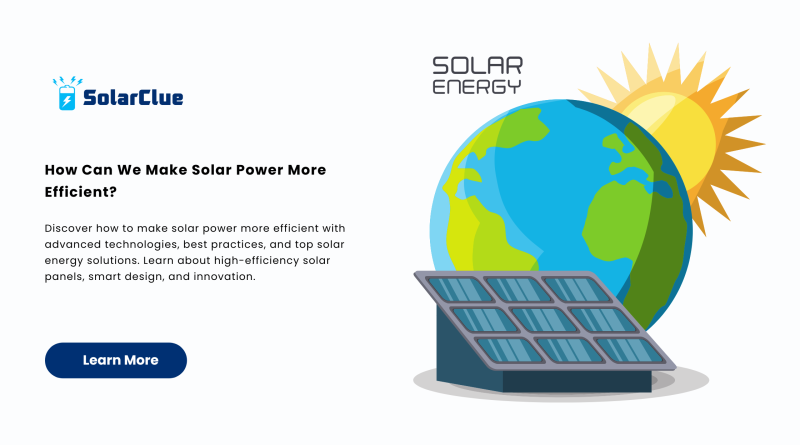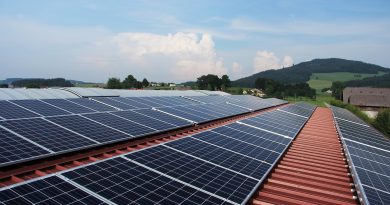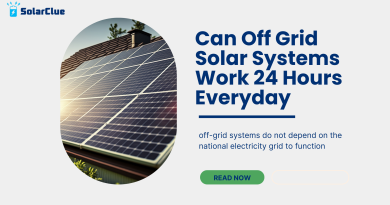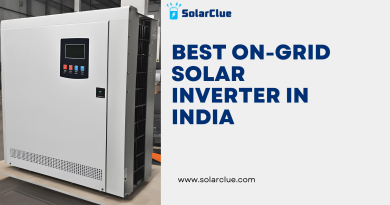How Can We Make Solar Power More Efficient?
As the world races toward cleaner energy sources, improving the efficiency of solar power becomes more important than ever. Whether you’re a homeowner, business owner, or an eco-conscious consumer, understanding how to maximize the output of your solar power system can significantly reduce costs and environmental impact.
In this blog, we’ll explore strategies, technologies, and practices that are revolutionizing solar energy solutions and making them more effective, accessible, and powerful than ever before.
Table of Contents
- 1 Understanding Solar Efficiency: What It Really Means
- 2 Upgrade to High-Efficiency Solar Panels
- 3 Optimize Panel Placement and Angle
- 4 Keep Solar Panels Clean and Maintained
- 5 Use Efficient Inverters and Storage Systems
- 6 Monitor and Manage Your Energy Use
- 7 Invest in Innovations in Solar Panels
- 8 Integrate AI and IoT for Smart Solar Energy Solutions
- 9 Design Energy-Efficient Homes and Buildings
- 10 Utilize Net Metering Programs
- 11 Choose the Right Solar Provider
- 12 Consider Government Incentives and Rebates
- 13 Embrace Community Solar Projects
- 14 Addressing Myths Around Solar Power Efficiency
- 15 Future of Solar: The Road Ahead
- 16 Final Thoughts
Understanding Solar Efficiency: What It Really Means
Efficiency in solar panels refers to how well they convert sunlight into usable electricity. The higher the efficiency, the more power you get from the same amount of sunlight. Traditional solar systems convert about 15-18% of solar energy into electricity, but newer high-efficiency solar panels can reach over 22%.
Upgrade to High-Efficiency Solar Panels
One of the quickest ways to enhance performance is to switch to high-efficiency solar panels. These panels are made using advanced photovoltaic (PV) cell technologies, such as PERC (Passivated Emitter and Rear Contact) and bifacial cells, which capture more sunlight and generate more energy.
Manufacturers like SunPower, REC, and LG are at the forefront of innovations in solar panels, offering models that not only improve efficiency but also reduce space requirements.
Optimize Panel Placement and Angle
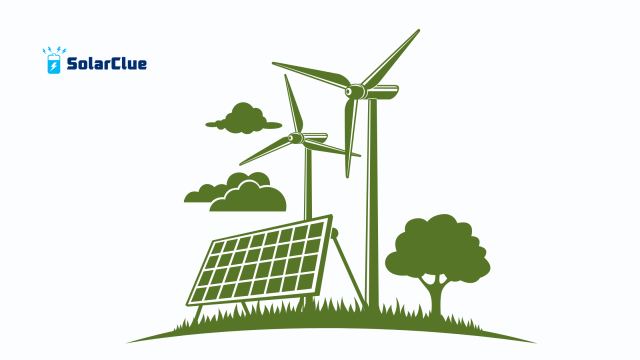
Even the most efficient panels won’t perform well if they’re not properly installed. Factors such as tilt angle, direction (orientation), and shading can significantly impact output. In the Northern Hemisphere, panels should ideally face south at an angle that matches your latitude.
Using solar trackers that follow the sun’s movement throughout the day can further increase performance by up to 25%.
Keep Solar Panels Clean and Maintained
Dust, leaves, bird droppings, and other debris can reduce solar panel efficiency. Regular maintenance ensures your solar power system continues to operate at peak levels. Professional cleaning services are available, or you can do it yourself with a hose and soft brush.
Use Efficient Inverters and Storage Systems
Inverters convert DC electricity from solar panels into AC electricity for home or business use. High-quality inverters like microinverters or power optimizers can increase the energy harvested from each panel.
Pairing your setup with modern lithium-ion or flow batteries ensures that excess solar energy is stored efficiently and used when needed, especially at night or during cloudy weather.
Monitor and Manage Your Energy Use
Smart solar systems come with real-time monitoring tools that track your energy production and consumption. Platforms like SolarEdge or Enphase Enlighten help users identify inefficiencies, reduce energy waste, and adjust their usage patterns.
Invest in Innovations in Solar Panels
The solar industry is constantly evolving. Recent innovations in solar panels include:
- Transparent solar panels
- Perovskite solar cells
- Solar skins (aesthetic panels that blend with your roof)
- Flexible and lightweight solar films
These breakthroughs aim to increase adoption by making solar power more efficient, adaptable, and aesthetically pleasing.
Integrate AI and IoT for Smart Solar Energy Solutions
Artificial Intelligence (AI) and the Internet of Things (IoT) are playing a growing role in enhancing solar energy solutions. Smart sensors, predictive analytics, and automated maintenance alerts help users optimize system performance with minimal manual effort.
Design Energy-Efficient Homes and Buildings
Pairing solar systems with energy-efficient appliances, insulation, and smart HVAC systems reduces the overall demand for electricity, making the solar power system even more effective.
Incorporating passive solar design (using windows, walls, and floors to collect and distribute solar energy) also enhances energy conservation.
Utilize Net Metering Programs
Net metering allows users to sell excess electricity generated by their solar system back to the grid. This not only improves ROI but also ensures no solar energy goes to waste.
Choose the Right Solar Provider
Partnering with a reputable installer ensures that your solar panel setup is optimized for your location, budget, and energy needs. Companies like SolarClue offer customized solar energy solutions with expert consultation and professional installation.
Consider Government Incentives and Rebates
Many regions offer tax credits, rebates, and incentives for installing solar power systems. Taking advantage of these programs reduces upfront costs and improves long-term savings.
Embrace Community Solar Projects
If installing panels on your own property isn’t feasible, community solar programs let you subscribe to shared solar power systems. These projects make renewable energy more accessible while still benefiting from cost savings and sustainability.
Addressing Myths Around Solar Power Efficiency
Some believe that solar panels don’t work in cloudy weather or that they’re too expensive. In reality, modern efficient solar energy systems work well in diffused light and costs have dropped significantly over the last decade.
Future of Solar: The Road Ahead
The future looks bright with continued investments in solar energy solutions. With global focus on sustainability, we can expect to see more breakthroughs in solar system designs, integration with EVs, and better grid infrastructure to support clean energy.
Final Thoughts
Enhancing the efficiency of solar power requires a holistic approach — from choosing the right solar panel technology to integrating smart tools and making conscious design choices. As the industry grows, so do the opportunities for individuals and businesses to tap into the power of the sun effectively.
For expert guidance and top-rated products, visit SolarClue and explore insights on blog.solarclue.com. Make your move towards a cleaner, more energy-efficient future today!
FAQs
1. What are the most efficient solar panels available in 2025?
Currently, SunPower and REC lead the market with solar panels offering 22-23% efficiency.
2. How can I increase the output of my existing solar panel system?
Clean your panels regularly, upgrade your inverters, and consider adding solar trackers or battery storage.
3. Is investing in high-efficiency solar panels worth it?
Yes, especially in areas with limited space or high electricity costs. They deliver more energy over time.
4. Does the orientation of solar panels matter?
Absolutely. Panels should ideally face south (in the Northern Hemisphere) for maximum sun exposure.
5. Can solar panels still produce energy during cloudy or rainy days?
Yes, though the output will be reduced, modern panels are designed to capture diffused light effectively.
To learn more about making your solar journey easier and smarter, feel free to visit our website – we’ve got all the sunny answers waiting for you!

